Violence and Power in the Thought of Hannah Arendt / Caroline Ashcroft.
Material type: TextSeries: Intellectual History of the Modern AgePublisher: Philadelphia : University of Pennsylvania Press, [2021]Copyright date: ©2021Description: 1 online resource (320 p.)Content type:
TextSeries: Intellectual History of the Modern AgePublisher: Philadelphia : University of Pennsylvania Press, [2021]Copyright date: ©2021Description: 1 online resource (320 p.)Content type: - 9780812297942
- 303.601 23
- online - DeGruyter
| Item type | Current library | Call number | URL | Status | Notes | Barcode | |
|---|---|---|---|---|---|---|---|
 eBook
eBook
|
Biblioteca "Angelicum" Pont. Univ. S.Tommaso d'Aquino Nuvola online | online - DeGruyter (Browse shelf(Opens below)) | Online access | Not for loan (Accesso limitato) | Accesso per gli utenti autorizzati / Access for authorized users | (dgr)9780812297942 |
Browsing Biblioteca "Angelicum" Pont. Univ. S.Tommaso d'Aquino shelves, Shelving location: Nuvola online Close shelf browser (Hides shelf browser)

|

|

|

|

|

|

|
||
| online - DeGruyter The Belief in Intuition : Individuality and Authority in Henri Bergson and Max Scheler / | online - DeGruyter Ghosts, Holes, Rips and Scrapes : Shakespeare in 1619, Bibliography in the Longue Durée / | online - DeGruyter Jews and Journeys : Travel and the Performance of Jewish Identity / | online - DeGruyter Violence and Power in the Thought of Hannah Arendt / | online - DeGruyter Battle Green Vietnam : The 1971 March on Concord, Lexington, and Boston / | online - DeGruyter True Blues : The Contentious Transformation of the Democratic Party / | online - DeGruyter I've Been Here All the While : Black Freedom on Native Land. |
Frontmatter -- Contents -- Introduction -- Chapter 1. The Modern State and Its Problems -- Chapter 2. The Jewish Army and the Reconstruction of a People -- Chapter 3. The Polis and the Res Publica -- Chapter 4. Revolutionary Politics and the Unleashing of the Social -- Chapter 5. Political Violence in Modernity -- Chapter 6. A Politics of Nonviolence? -- Chapter 7. A Space for the Political -- Notes -- Bibliography -- Index -- Acknowledgments
restricted access online access with authorization star
http://purl.org/coar/access_right/c_16ec
Hannah Arendt was one of the foremost political theorists of the twentieth century to wrestle with the role of violence in public life. Yet remarkably, despite the fact that it was perhaps the most pressing issue of her era, this theme in her work has rarely been explored. In Violence and Power in the Thought of Hannah Arendt, Caroline Ashcroft deepens our understanding of Arendt's conception of the role of violence, offering a critical reading of her work and using it as a provocation to think about how we might engage with contemporary ideas.Arendt has generally been thought to exclude acts of violence from "the political," based on her supposed idealization of ancient democratic politics. Ashcroft argues that Arendt has been widely misunderstood by both critics and advocates on this. By examining Arendt's thought on violence in key examples of political practice such as modern Jewish politics, the politics of Greece and Rome, and the French and American revolutions, Ashcroft reveals a more pragmatic notion of the place of violence in the political. She argues that what Arendt opposes in political violence is the use of force to determine politics, an idea central to modern sovereignty. What Arendt criticizes is not violence as such, but the misuse of violence and misunderstandings of politics which exclude participatory power altogether.This work also engages with a wider set of concerns in political theory by obliging us to rethink the relations between violence and politics. Arendt's work offers a way to bridge the gulf between sovereign or realist politics and nonhierarchical, nonviolent participatory politics, and thus offers valuable resources for contemporary political theory.
Mode of access: Internet via World Wide Web.
In English.
Description based on online resource; title from PDF title page (publisher's Web site, viewed 01. Dez 2022)


